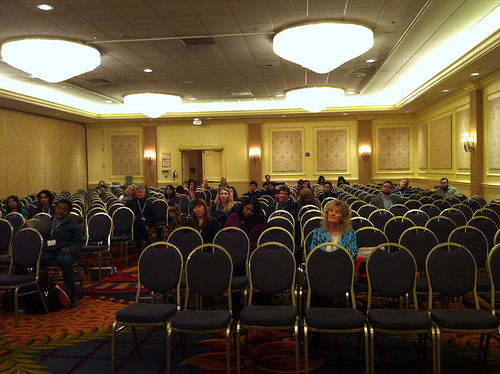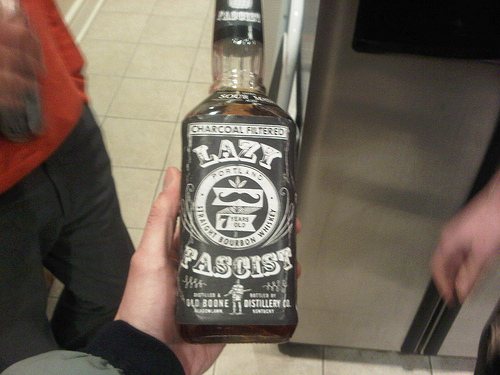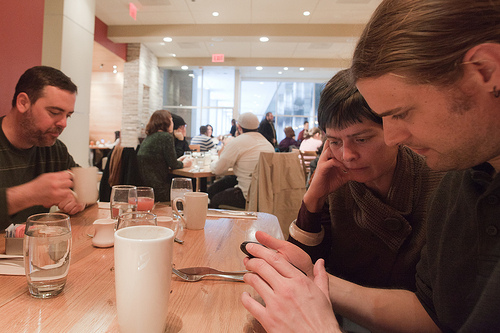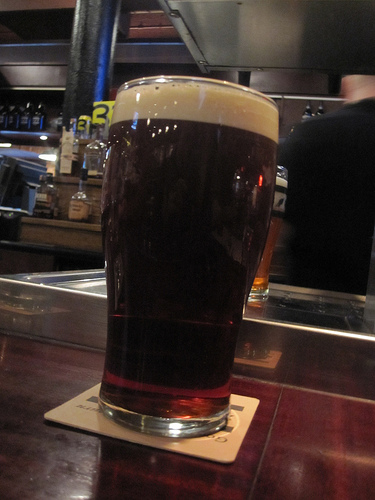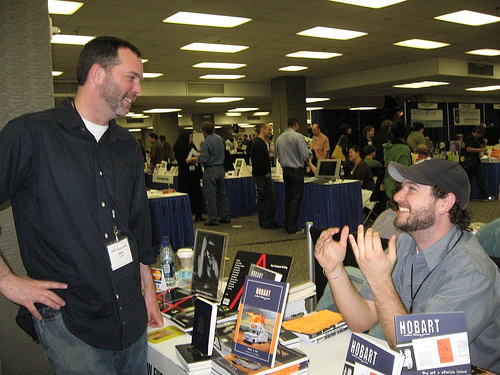~by Morris Collins
***
For many young writers AWP is a source of anxiety and dread. The world does nothing if not produce young writers and young writers do nothing if not worry about the same things: How do I get published? How do I get the girl/guy with the awesome ink to like me—even though I am not published? These are reasonable concerns—I mean, AWP only happens once a year and you don’t want to blow it, because let’s face it, you can’t even afford to be here this year—but unfortunately in the lead-up to the conference you’re going to read a lot of very bad advice: AWP is about forging bonds of art and community, AWP is a time to show your gratitude to the other pilgrims on your lonesome path, AWP is a chance to revel in the aesthetic endeavors of those, like you, who make things.
Really? Who needs a lanyard to revel? AWP is about networking, taking names, and getting known. Here’s how:
1. REGISTER UNDER AN AWESOME PSEUDONYM: Faulkner, Hemingway, Pynchon, Zadie, Lahiri—awesome writers have awesome names. Do you have an awesome name? Probably not. So this year choose a really kickass writer name and register under it. What makes a good writer name? Something striking, and timeless, and austere. ‘Percy’ is hot this year. ‘Amis’ has worked for ages. ‘Wright’ has great puntential—it launched brothers Charles and James into poetry superstardom, just after they invented the airplane. (But what about all my publications under my real name, you may ask? Come on. If you don’t know this trick, you don’t have any publications). Think about it: your writing is supposed to expose the best of what’s inside, the scope and grandeur of your soul. So shouldn’t your name reflect this? Cormac McCarthy was born Eugene Needleman. Need I say more? Yes. You think anyone this side of 1920 still names their kid ‘Morris’?
2. Next, and this is the most important part, MAKE 100 PHOTOCOPIES OF YOUR HANDWRITTEN MANUSCRIPT, staple them, and then carry them around in your regulation AWP tote bag. (Absolutely, do not put books or journals that you buy into this bag. Why? Every time you buy a book or journal you’re supporting other writers’ careers, and—just like wealth—you can’t redistribute fellowships or contracts. As their career moves forwards, yours moves back). If you can’t handwrite your manuscript, you must type it on a typewriter and then photocopy it while the ink’s still wet. Remember, you want to stand out; you have to look the part. So go old-school and put two spaces after every period. You’ve heard editors complain about this? Art knows no trend and neither should you. Don’t worry about that extra space—they’ll fix it in layout. What is it you think editors do?
3. Now put your manuscripts in the biggest binder you can find—you might need a few tote bags—toss on a cover sheet with a fancy font and DISTRIBUTE THEM TO EVERY PUBLISHER AT THE BOOKFAIR. Seriously, this is why people come to AWP. Do you think anyone is going to go to panels like “Swimming Upstream: Ecopoetics and Salmon as Metaphor for the Writing Life in the Pacific Northwest”? Of course not. Seventy-three percent of the advertised panels don’t even occur. So hit the bookfair, and hit it hard. Does some grad student want to tell you about her journal? Does some poetry editor want to give you “submission guidelines”? Don’t let them. Raise your finger to your lips, hand them your manuscript, wink, walk away.
4. Sometimes, though, an IMPORTANT WRITER or AN ATTRACTIVE WRITER will be sitting at the table. In this case it is best to pitch your manuscript verbally, but when you do, make sure not call it a novel or a collection. You’re surrounded by 10,000 other jackasses with novels and collections. Break the mold. You’re writing a “suite of stories” or a “a liniment of poems.” If asked to describe it, remember: they don’t actually care. They’re like NSA wiretappers: they’re just looking for buzzwords. So buzz out: “My prosody trembles at the intersection of desire, community, and abject nausea.” That sort of thing.
5. After ten hours in the bookfair, it’s time for the cocktail parties. These are the parties where you re-approach the ATTRACTIVE WRITERS from earlier in the day in the hope of wooing them into bed and then guilting them into a journal acceptance. In these interactions make sure to WITHOLD PRAISE. There are going to be a lot of people behaving politely at AWP—complimenting each other, giving useful feedback, being “literary citizens.”
6. Don’t fall into this trap.
How many great writers are nice? Hemingway shot every animal on sight. Mailer stabbed his own wife. You think if Richard Ford and Colson Whitehead bumped into each other it would be all, “I really like the things you make Richard.” “Oh yeah, me too Colson! You really hit your stride with that zombie novel.” You see Dale Peck making nice with Rick Moody? What about Bret Easton Ellis? Alice Hoffman?
Hell, I bet there’s not a conference in the country my editor could walk into without getting beaten up.
These people aren’t nice and these people are bosses. Learn from them. Ask the ATTRACTIVE WRITER about their work—then seem unimpressed. Hold up a copy of his or her journal or book, lower your glasses and stare very hard at the binding. Snort, shrug, smile. Say, “looks great” and hand it back without making eye contact. At this point they will be shivering for your approval. They’ll say, “what’s your name again? Where can I find your work”? Lift your lanyard to their guppy eyes, watch them read “LIAM XANTHER BELLOW,” sip your artisanal rye old-fashioned (no fruit), lick your lips, say “I prefer to publish on The Continent, but if you wish…” Let your sentence hang there unfinished like any beautiful possibility. Somewhere, certainly, Arcade Fire is playing. Sip your drink again. Wince. Everything is too sweet for this life. Reach into your tote bag and drop your manuscript into their waiting, outstretched hands.
7. I’ll see you there.
***
![[PANK]](https://pankmagazine.com/wp-content/themes/pank/assets/images/pank-logo-large.png)

